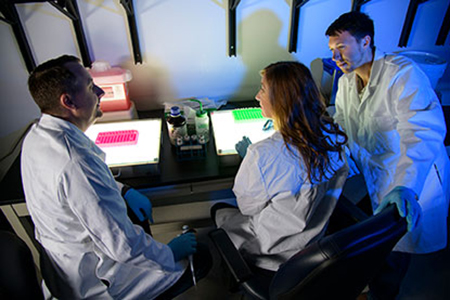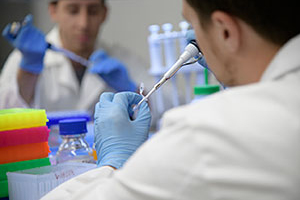 Welcome to the Division of Endocrinology, Diabetes and Metabolism research page at the University of Arizona Department of Medicine and College of Medicine – Tucson. We have nine Endocrinology Faculty members with active basic research programs that focus on diabetes, metabolic and endocrine-related scientific projects.
Welcome to the Division of Endocrinology, Diabetes and Metabolism research page at the University of Arizona Department of Medicine and College of Medicine – Tucson. We have nine Endocrinology Faculty members with active basic research programs that focus on diabetes, metabolic and endocrine-related scientific projects.
Endocrinology research incorporates cell, animal, and human translational models to study aspects like mitochondrial bioenergetics in type 2 diabetes and pulmonary hypertension, epigenetics of insulin resistance, bone metastasis, adipose tissue disorders, glucagon action, and insulin-stimulated GLUT4 trafficking and glucose uptake.
Endocrinology Faculty Engaged in Biomedical Research
All of the faculty members below also are members of the UA Health Sciences Center for Disparities in Diabetes, Obesity and Metabolism:
- Dawn Coletta, PhD, Associate Professor of Medicine, Physiology and the Physiological Sciences Graduate Interdisciplinary Program (GIDP) — Dr. Coletta, who joined the UA faculty in August 2016, is an independent and highly productive scientist with a translational program studying the molecular basis, genetics and epigenetics of insulin resistance in humans, which is a characteristic feature of a number of common metabolic diseases including type 2 diabetes mellitus, obesity and the insulin resistance syndrome.
Researcher Spotlight ►►►
Coletta Lab
- Janet Funk, MD, Professor of Medicine, Nutritional Sciences and Physiological Sciences GIDP — Dr. Funk leads an NIH-funded cross-disciplinary translational research program investigating the pathogenesis and treatment of resorptive bone diseases, such as breast cancer bone metastases and rheumatoid arthritis (RA), with a particular focus on elucidating the metabolism and bioactivity of bone-protective plant-derived polyphenols.
Researcher Spotlight
Funk Lab ►►►
- Paul Langlais, PhD, Associate Professor of Medicine and Physicological Sciences GIDP — Dr. Langlais serves as director of the UA Quantitative Proteomics Laboratory. His research focuses on identification and characterization of proteins in insulin signal transduction and testing whether dysfunction of these proteins is involved in the pathogenesis of insulin resistance and type 2 diabetes. He specializes in mass spectrometry to perform proteomics, a technique that allows for large-scale quantitative analysis of protein abundances between different treatments. This approach led him to the discovery that CLIP-associating protein 2 (CLASP2) is responsive to insulin stimulation, and his now-published findings support involvement of CLASP2 in insulin-stimulated glucose uptake.
Researcher Spotlight ►►►
Langlais Lab
Proteomics Lab
- Lawrence Mandarino, PhD, Professor of Medicine — Dr. Mandarino is chief of the Division of Endocrinology, Diabetes and Metabolism and director of the Center for Disparities in Diabetes, Obesity and Metabolism. His research focus includes mechanisms of insulin resistance in skeletal muscle and liver disease as well as the mechanisms of fatty liver development. His lab's work is aimed at providing new targets for treating insulin resistance syndrome (or metabolic syndrome), which increases the risk of obesity, type 2 diabetes, cardiovascular disease and other cardiometabolic conditions, all areas of special concern in the Latino population.
Researcher Spotlight ►►►
Mandarino Lab
CDDOM
- Ruslan Rafikov, PhD, Assistant Professor of Medicine and Physiological Sciences GIDP — Dr. Rafikov's research focuses on his work with endocrinologists, cardiologists, pulmonologists and critical care, biostatisticians and proteomic specialists within the UA Department of Medicine, the largest department in the UA College of Medicine - Tucson. His current NIH R01 grant is studying pathogenic mechanisms involving molecular and metabolic pathways that influence pulmonary arterial hypertension (PAH), a form of high blood pressure in the lungs that leads to an enlarged heart and eventual heart failure.
Researcher Spotlight ►►►
Rafikov Lab
- Olga Rafikova, MD, PhD, Assistant Professor of Medicine and Physiological Sciences GIDP — Dr. Rafikova's research interests include: Redox biology and protein post-translational modifications that compromise critical cell enzyme function and lead to development or exacerbation of vascular disease, manifestation of sexual dimorphism and gender-specific signaling in pulmonary hypertension, and the role of mitochondrial dysfunction in pulmonary hypertension. In her work, she utilizes an integrative manner of research and addresses the problem on multiple levels including protein level, cell signaling, animal models of disease, and finally studies in humans.
Researcher Spotlight ►►►
Rafikova Lab
- Jennifer Stern, PhD, Assistant Professor of Medicine, Physiology, BIO5 Institute, and Physiological Sciences Graduate Interdisciplinary Program (GIDP)
Dr. Stern leads an NIH funded research program focused on understanding the role of glucoregulatory hormone signaling in the pathogenesis of obesity, type II diabetes mellitus, and aging. The goal of Stern lab research is to improve the prevention and treatment of diabetes and age-related metabolic disorders.
Researcher Spotlight ►►►
Stern Lab
- Wayne T. Willis, PhD, Associate Professor of Medicine and Physiological Sciences GIDP — Dr. Willis studies basic mechanisms underlying energy transduction in mitochondria isolated from skeletal muscle, the liver and heart. He did his postdoctoral work on the effects of dietary iron deficiency on the thermodynamics of mitochondrial oxidative phosphorylation. Recent work supported by the National Science Foundation (NSF) has focused on structure/function differences and associated cost/benefit trade-offs in the mitochondria of slow-twitch (type I) versus fast-twitch (type II) skeletal muscle. He also experiments on fuel selection during human locomotion (primarily walking) in disabled and able-bodied populations, which forms the basis of a recent proposal to NSF on evolutionary implications of walking at a spontaneously chosen speed and the associated skeletal muscle metabolism.
Researcher Spotlight ►►►
Willis Lab
UAHS Center for Disparities in Diabetes, Obesity and Metabolism
The UAHS Health Sciences Center for Disparities in Diabetes, Obesity and Metabolism—led by Endocrinology Chief Lawrence J. Mandarino, PhD—serves as a nucleus for interdisciplinary studies that form the foundation for translation of biomedical research to advanced, evidence-based clinical care in the community. A major focus is to facilitate development of innovative approaches to delivery of care and prevention, serving a diverse population in one of the most high-risk yet underserved regions in the nation. The center also is working to create a biobank and research registry focused on obesity and type 2 diabetes risk in the Hispanic/Latino population, while also creating a biobank registry with patient bio-specimens that would be accessible to other studies focusing on other aspects of health of importance to the local community and broader population.
Quantitative Proteomics Lab
 The Quanitative Proteomics Lab at the UAHS Center for Disparities in Diabetes Obesity and Metabolism is a proteomics-based facility that applies mass spectrometry-based technologies to significant biological problems. The mission of the proteomics lab is to provide collaborators the opportunity to take advantage of next generation mass spectrometers and software platforms to perform label-free quantitative proteomics. It is directed by Paul Langlais, PhD, and Natalie Barker. Contact us to discuss how proteomics can be applied in your research.
The Quanitative Proteomics Lab at the UAHS Center for Disparities in Diabetes Obesity and Metabolism is a proteomics-based facility that applies mass spectrometry-based technologies to significant biological problems. The mission of the proteomics lab is to provide collaborators the opportunity to take advantage of next generation mass spectrometers and software platforms to perform label-free quantitative proteomics. It is directed by Paul Langlais, PhD, and Natalie Barker. Contact us to discuss how proteomics can be applied in your research.
Clinical Research Studies at the UArizona Health Sciences
How to Participate
Whether you’re a potential candidate to participate as a patient or subject in the study, you would like to participate as a “healthy volunteer” for the control group or you’re a research or clinical professional interested in collaborating with the research team—simply contact the study coordinator listed for each individual clinical research study above.
Other Research Studies
Coming Soon...
LEARN MORE ABOUT UA DEPARTMENT OF MEDICINE RESEARCH
LEARN MORE ABOUT UA COLLEGED OF MEDICINE – TUCSON RESEARCH


